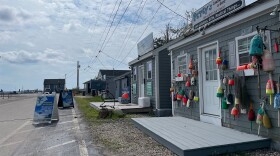New rules that took effect last month shift the costs of at-sea monitoring to local fisherman.
Critics say these new fees threaten the very existence of New Hampshire’s dwindling fishing industry and will put people out of business. There’s now a lawsuit pending on the issue.
Jeff Feingold, editor of the New Hampshire Business Review, joined NHPR’s Morning Edition to talk about the issue.
Let’s start with some background – what are these fees all about?
Back in 2010, they put these new rules together that limited the amount of ground fish that could be caught; that’s cod, haddock, and other fish, a lot of what commercial fishermen are looking for.
That was in response to dwindling stocks?
Right, so they put these quotas in there to make sure the fishermen were adhering to these quotas, they had monitors on their boats. And until just very recently, last month, the National Oceanic and Atmospheric Administration, had been covering the cost of the monitors. But now they’ve lost a court suit involving some other aspect of the quotas, and NOAA said you have to pay for it yourselves to the commercial fishermen.
So that shifts all of the cost?
Yes, to pay for the monitor, who are contractors, and pay the companies. According to the fisherman, that could cost up to $710 per trip. And you have to put it into perspective because the fishing industry, especially in New Hampshire, has been just devastated, not just by the quotas, but the marketplace for fish.
And what impact is this having on New Hampshire’s fishing industry?
The monitors are there to make sure they don’t break their quota limit. The fishermen we spoke to were supportive of the quotas and say they’re working because apparently the cod stock, which is the big money fish in the waters around here, they’ve been coming back. But their concern is that they’re paying for someone to make sure they’re adhering to these rules, and their argument is do farmers have to pay for USDA people to inspect their meat? And it’s also an industry where the profit margin is miniscule.
So these fishermen are saying the costs of these monitors could break them.
Absolutely. They’re staying in business because they’re waiting for June, which is when the real ground fish season opens, they’re hoping to get some more business going. That’s why they’re staying in business now. Basically, the argument is NOAA is charging them to earn a living.
We’ve seen New Hampshire’s two U.S. Senators push back on these fees, and there’s now a lawsuit on this issue. Where do things stand in terms of blocking these new fees?
Right now, NOAA says it doesn’t have the money because it doesn’t have the authorization to pay for the monitoring. What Sen. Ayotte is trying to do is get them to put wording in their rules to say they can use this money. It’s less than $4 million. And right now, there’s a lawsuit, including a New Hampshire fisherman and fishermen from Maine to North Carolina, who are challenging NOAA on this.
What’s the timeline on this lawsuit? Will we see some action before June?
It looks as if at some point they’ll be some solution in Washington before this suit sees the light of day, although it is being expedited. So there’s pressure from Congress and pressure from this lawsuit. That’s usually how bureaucracies respond when there’s pressure from two sides. They’ll come up with some solution before things get nasty.










